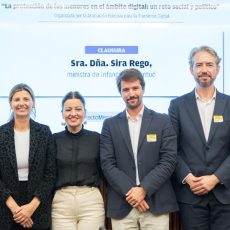
How to incorporate the current rights framework into the digital environment? And how to protect these rights in this area? The Spanish Ministry of Economic Affairs attempts to answer these two questions in what has been titled the Digital Rights Charter, which it presents as part of its ‘España Digital 2025’ plan. This is a document whose purpose is to guide future policy decisions and actions by public authorities.
The European Association for Digital Transition (EADT) has participated in the public consultation process held by the Spanish government. We did so based on the belief that it is necessary to adapt current regulatory frameworks to the digital transition, especially in areas where inequality, discrimination, lack of equal treatment or violation of citizens’ fundamental rights and freedoms are created. It is clear that the huge economic and social transformations involved in digitalization make it necessary to update the basic tools of the rule of law. Rights, duties and freedoms must be the same in both the analogue and the digital worlds.
Below we briefly outline our recommendations on the Charter, already submitted for the public consultation process.
Greater clarity and order
The Charter recognizes it is not regulatory in nature and includes rights already recognized and developed in national legislation, along with other new ones. This is a strange mix. The relationship of rights, principles and simply declarative statements makes it an unbalanced and abstract instrument, halfway between a classic Bill of Rights and a Declaration of Principles. What draws attention, and should be improved in the final wording, is the existing and appreciable imbalance between vague statements and very detailed developments on some subjects, suggesting a certain arbitrariness in the content or, at least, a lack of sufficient explanation of the criteria used.
In this sense, we think the Charter is redundant, and even obsolete, in its mention of certain rights, for example in the social and labour market areas. This is the case, we believe, with the right to digital disconnection – already recognized in an Organic Law – and the right to privacy in the use of digital devices, video surveillance and geolocation systems, also covered by existing legislation and the object of many court judgments.
Rights… and duties
The Charter, based on its own name, focuses on citizens’ rights in the digital environment, but it is also necessary to establish their duties. Both individual and collective responsibility is necessary to have a society that is informed and aware of risks and opportunities. One of the greatest efforts in this regard is the obligation to read, know about and delve deeper into everything that is signed or consented to in the digital environment, so the citizen knows the consequences of their actions.
The regulatory framework (and even more if it deals with constitutional rights) is a necessary but insufficient condition to protect citizens from situations such as abuse of a dominant position, violations of their privacy or misuse of their data, among others. That citizens act responsibly is equally as important, if not more. Often they face situations where they are saturated with information and don’t have the right tools to be discriminating about what they see; the idea is to not just focus on the cost or speed of the services offered to them.
More participation, and more diverse
To reach the full potential of a Fundamental Rights and Duties Charter in the digital sphere would require participation from all relevant stakeholders and organizations. We believe that important groups are missing in the design of the Charter as to digital rights usage areas such as security, defence, justice, child protection, education, etc.
Update with new European regulations
Due to when it was drawn up, the Charter doesn’t mention either the Digital Markets Act or the Digital Services Act, which will have fundamental importance and should be added to the document’s final version.
General conclusions
At the EADT we think these types of regulatory frameworks for the Digital Transition should have a practical, not theoretical, nature, delving deeper into issues such as competition, open markets, the fight against the creation of monopolies, guarantee of respect for fundamental liberties, etc. This is the approach taken by European institutions, where both the citizen and the data they create are protected.
In the European context, Spain is lagging behind in regulatory development of new channels for the digital age. While legislative processes are already taking place in the European Union that influence situations such as concentration of market power, equal treatment, digital sovereignty and the tools necessary to ensure the rule of law and compliance with legislation, Spain has only taken important steps in implementing new legislation on data protection and the regulation of telecommuting.
And yet, it is a country that can play a very important role in building a Europe that can lead in digital and technological terms. This is because it has qualities that are difficult to find in its competitors when it comes to hosting technology centres, that is, the ability to innovate, good use of existing resources, wealth, and territorial diversity. There’s a long way to go and, as such, despite the criticism expressed earlier, we welcome the preparation of this document and it’s being shared with civil society.




